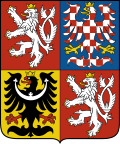 |
|---|
|
|
All elections in the Czech Republic are based on the principle of universal suffrage. Any adult citizen who is at least 18 years old can vote, except those who have been stripped of their legal capacities by a court, usually on the basis of mental illness. Elected representatives are elected directly by the citizens without any intermediaries. Election laws are not part of the constitution, but – unlike regular laws – they cannot be changed without the consensus of both houses of the Parliament.[1] The Czech Republic uses a two-round plurality voting system for the presidential and Senate elections and an open party-list proportional representation system for all other elections. The proportional representation system uses the Sainte-Laguë method for allocating seats.
Elections are usually held over two days, from 14:00 to 22:00 on Friday and then from 8:00 to 14:00 on Saturday.
- ^ "Constitution of the Czech Republic". Chamber of Deputies, Parliament of the Czech Republic. Retrieved 31 January 2021.